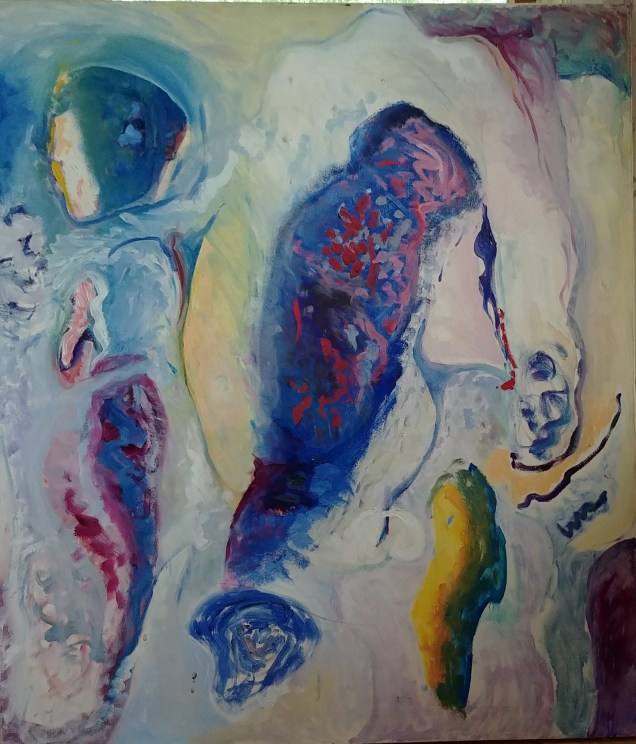
It’s one thing to want communication for your child. It’s another to do what is required to allow communication to take place.
Let’s not sugar coat this. Most of us get impatient with people who require special work to know, or care for, or listen to. Our eyes glaze over, and we begin to think what we might be doing, elsewhere, when a friend take too much time or too many words. I long to share with the world what Owen, Edward, and I have learned about supporting communication for nonverbal people. Especially with those now sitting in silence, or unable to make their language say what they want it to. But the truth is that facilitating communication is quite difficult. The theory is simple, the practice arduous. How many will have time, energy, patience to let someone speak who isn’t speaking on his own?
So as much as I wish for Owen a community of fellow typers, and for the nonspeaking folks I see everywhere to have access to this method, I have to wonder how many will be granted these tools to scale the barriers that stand in their way? Will families have time and energy to help their child/brother/sister speak? Will other people slow down their lives to wait for those words to journey down misfiring neurons and muscles, down uncooperative arms and fingers, to the paperboard or the laptop screen? If a person with autism turns away, if they look like they have nothing to say, will family or caregivers go after them to make sure that body movements are representing real feelings?
Owen described recently that when he want to run towards something, his body runs away from it. Ido Kedar describes the same thing (Ido in Autismland). How many of our young people with autism are misread this way every day? How many are punished in a hundred ways, lost opportunities, misunderstood choices, a life of constant frustration, because of their disordered, chaotic movements? We earthlings read bodies to understand people, and we believe what we see. Even when we know better.
Writing with Owen looks like this: it’s messy – lots of interruptions. It’s hard – for both of us. It’s slow. And it’s absolutely beautiful. There are Owen’s thoughts and ideas, his words, typed out, bit by bit, onto the tablet screen. Is there influence, depending on who supports him? I imagine there is. Isn’t there always influence? Owen is new to writing, he is vulnerable. Learning to support a typer is technically easy; the difficulty is all in the ego department. As a communication partner or support, you must learn to keep your opinions, your impatience, your expectation and assumptions about what’s coming down the communication pipeline, your excitement even, to yourself. You are helping communication to happen, but the communicator isn’t you.
What makes me a good support for my son is that I am a highly intuitive person, and I have been reading him for meaning (often incorrectly) all his life. And I love it – I get enormous joy from hearing what he writes. I love his insights. But what makes me good is also what makes me dangerous. I must not guess, I must not assume based on my intuition. Being a communication partner winds up basically a spiritual practice: letting go control, in so many ways.
Do I have the chops for it? Will I allow resentment about what I could be doing (like my own writing) to spill into the energy between Owen and me? Will I respond to the siren call of impatience, the longing for Owen to complete project, to come out my mouth? Even percolating in my brain, my anger, frustration, impatience, desire to control will shut him down (not entirely, but it sure doesn’t help).
And it isn’t simple to know where these boundaries lie. I imagine they are different with every person who types to communicate. But part of my job for Owen is to help him get his body to table, while still allowing him to chose not to be there. I don’t want to drag him there. But if he types that he wants to write, I believe THAT, and not what I SEE. I am also learning to see his attempts. Owen tells us how hard he is trying, all the time, to go where he wants to go, to not grab what isn’t his. So I speak encouragingly. I go find him. I tug on his clothing gently. Or I sit at the table and wait, believing in him, while he convinces his body inch by inch to get there. I do what seems to work for him. On the good days, I remember all this.
I love writing with my son. Even though the bitchy, mouthy, impatient side of me gets in our way, and Owen’s dark moods don’t help, watching another writer begin to express himself gives me enormous joy. So yes, praise God, I believe I can learn to have the chops. And I am able to, as well as willing to, give my time. Owen will need other supports though — this is his first step. I remind myself that Helen Keller required a support to live and survive and communicate to the outside world. Owen will require these supports too.
Wonderfully, Owen’s personal support and his siblings have put real energy into learning to listen to and to support their brother’s communication too. The more people Owen works with (learns to be facilitated by) the better, to establish his own voice and improve his confidence and skills.
It troubles me the inaccessibility of these tools. Once again the number of dollars in a person’s pocket seem to dictate the quality of their life, to the extent of having a voice. But I remind myself that the only reason that we know about Helen Keller today is because her parents were wealthy enough to go to the ends of the earth, looking for some kind of help for their daughter. I have thought of them, and of Helen and Annie Sullivan, so many times over these 25 years of our searching. Their means provided Helen a one-to-one support and so a voice for her entire life, rather than sitting in a dark corner. And because it happened for Helen Keller, eventually it happened for more blind children. Ido Kedar, and Matteo Musso, and Owen Simons are paving the way for others.

Love it, Wystan. What a labor of love!
LikeLiked by 1 person
Thanks so much for sharing this, Wystan. I share your joy.
LikeLiked by 1 person
Awesome blog! You nailed it!
LikeLiked by 1 person
I marvel at your patience, and I’m happy that you are rewarded with joy!
LikeLiked by 1 person